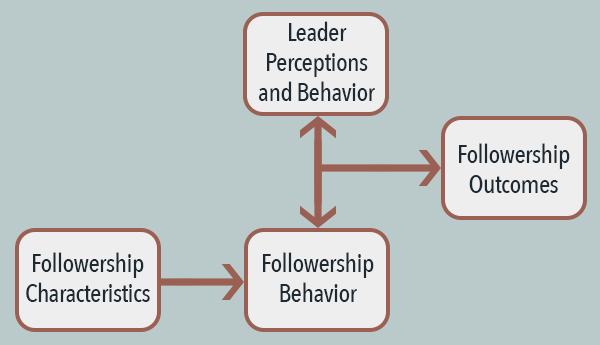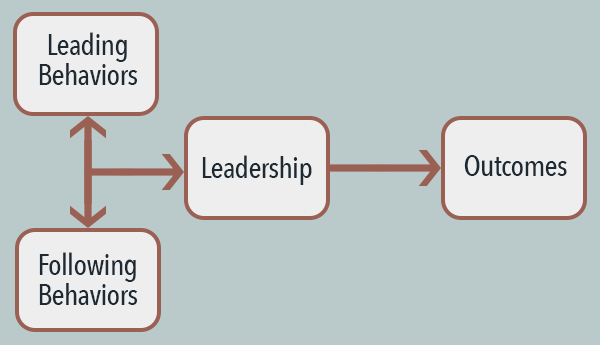Leadership has four main components: process, influence, group context, and goal attainment (PSU WC, 2021, L. 3). From these components we can see that for a leader to influence or attain a group context, there must be a group of followers for these constructs to be appropriately applied. The act of followership has been studied and broken into two theoretical frameworks: the role-based approach and the constructionist approach (Uhl-Bien, Riggio, Lowe, & Carsten, 2014). While there has been much research and consideration into the phenomenon of leadership, followership as well holds a significant amount of importance, and it is necessary to treat the subject equally to better our understanding of these phenomenon.
Is a leader truly a leader if they have no followers? This question is not only thought provoking and seemingly obvious, but it is necessary to consider. Qualities of a leader add up to one main job, and that is to lead. Would it be fair to say that an individual’s followers contribute to the success, failure, and behaviors of a leader (Uhl-Bien, et al., 2014, as cited in PSU WC, 2021, L. 3)? Uhl-Bien, et al. (2014) states that leadership is a co-created process, and in order to understand one we must understand the other (Fairhurst & Uhl-Bien, 2012, as cited in Uhl-Bien, et al., 2014). This idea means leaders and followers share and work towards the goal together, learning from and building off each other throughout the process.
The role-based approach, known as reversing the lens, looks at the impact followers have on the outcome of leadership and focusing on this reversed impact (PSU WC, 2021, L. 3). The image below presents a visual demonstration of the theoretical model of the role-based approach.

cited from: (Northouse, 2018, p. 304, as cited in PSU WC, 2021, L. 1)
The constructionalist approach, or the relational-based approach, looks at how the interaction between leader and follower influence the leadership outcome rather than how the behaviors affect it (PSU WC, 2021, L. 3). The image below depicts the different, relational-based perspective of followership.

cited from: (Northouse, 2018, p. 305, as cited in PSU WC, 2021, L. 3)
In blatant terms, Uhl-Bien, et al. (2014) explains role-based followership being the “leader as recipient or moderator of follower influence in producing outcomes” and constructionist followership being the “followers as co-creators with leaders of leadership” (Uhl-Bien, et al., 2014).
The next question is, how exactly do these two theoretical approaches of followership help us understand its effects on leadership and how we define it? With more information being gathered we can begin to make significant connections between leadership and followership, and all the ways they work with or against each other. Followers are important in the leadership process because they are the ones assigned to carry out the tasks working in favor of the leader and group, they both support and challenge the leader, and they also learn from the leader (PSU WC, 2021, L. 3). Since followers play such a large role in the outcome of the leader’s and group goals, it is understandable that researchers are interested in the influences followership has. When defining leadership it is important to take in account that it is not only the leader that guides the group to its goals, but also the followers guiding the leader.
There are many powerful influences and components of leadership that are often overlooked upon initial observation. Researchers and theorists have been making strides to make more connections on how followers affect leaders and vice versa. “Focusing on followership helps us recognize the value of followers and their contribution to leadership” (PSU WC, 2021, L. 3). When we are able to value followership, we will be better able to value and define leadership.
References
Fairhurst, G. T., & Uhl-Bien, M. (2012). Organizational discourse analysis (ODA): Examining leadership as a relational process. The Leadership Quarterly, 23(6), 1043–1062. https://doi.org/10.1016/j.leaqua.2012.10.005
Northouse, P. G. (2018). Leadership: Theory and practice (Eighth Edition). Los Angeles: SAGE Publications
Pennsylvania State University World Campus (2021). PSYCH 485 Lesson 3: Followership. Retrieved from https://psu.instructure.com/courses/2137573/modules
Uhl-Bien, M., Riggio, R. E., Lowe, K. B., & Carsten, M. K. (2014). Followership theory: A review and research agenda. The Leadership Quarterly, 25(1), 83–104. https://doi.org/10.1016/j.leaqua.2013.11.007
